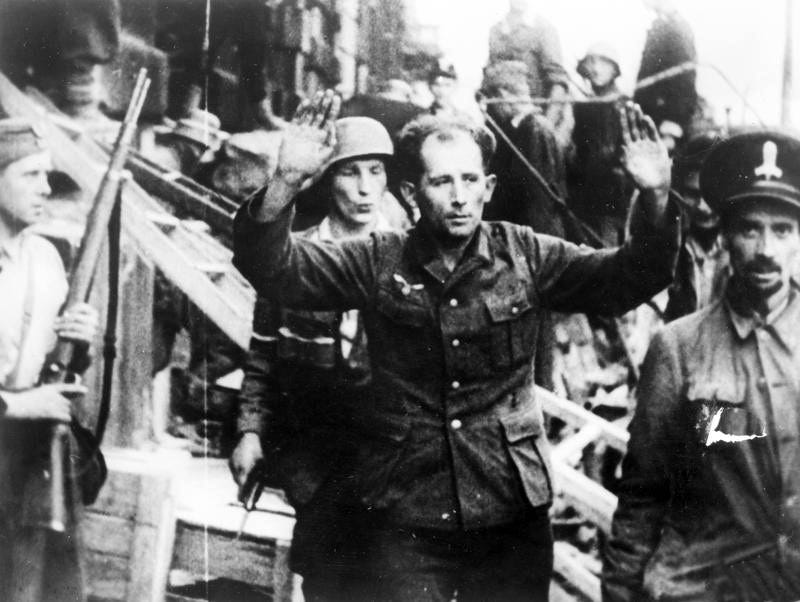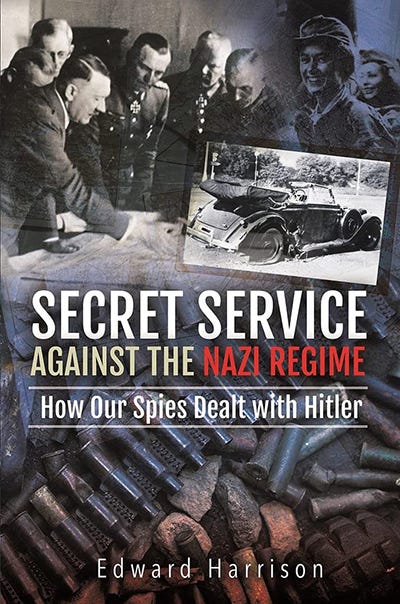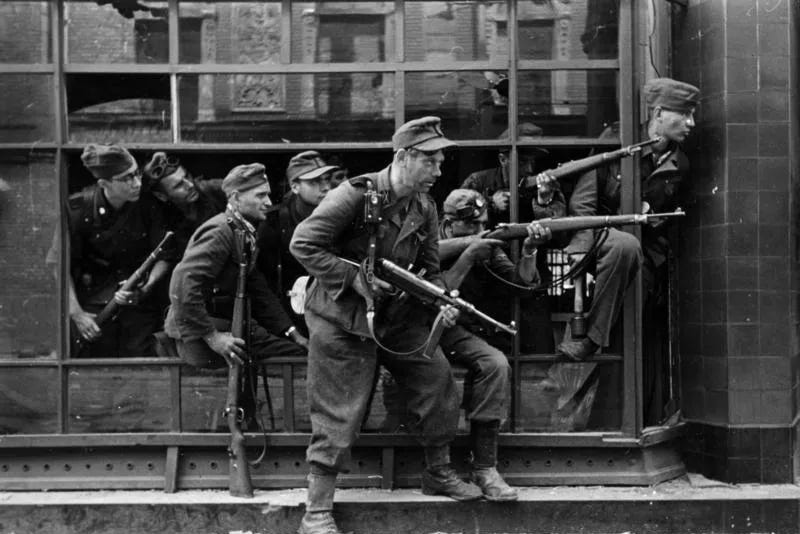Secret Service against the Nazi Regime
How the British Special Operations Executive sought to support the Polish Home Army - but full support for the Warsaw Uprising proved to be a step too far

Edward Harrison has specialised in research into secret operations during the war since graduating from Oxford University. New access to previously secret wartime material recording the work of the Special Operations Executive and other secret agencies led to him publishing a series of articles in academic journals. They have been gathered together in Secret Service against the Nazi Regime - How Our Spies Dealt with Hitler.
Despite being academic in origin these essays are lucid expositions of previously hidden areas - useful to anyone trying to understand the internal politics and other pressures on the secret services during the war.
The following excerpt describes how the Polish insurrection in the Warsaw Uprising caused enormous tensions both between the British and the Poles and within the British military establishment.
On 29 July On 29 July 1944 General S. ‘Tabor’ Tatar, former Director of Military Operations of the Home Army, met with Gubbins and other SOE officers in London. Tabor informed those present that General Bor intended to launch a rising to liberate the capital in the immediate future.
He then presented Gubbins with a list of specific demands for assistance, namely (1) an increase in the level of supplies and dropping operations to take place in the Warsaw area; (2) the bombing of airfields in the Warsaw area; (3) Polish fighter squadrons to be transferred to Warsaw once the secret army had captured airfields; (4) the first Polish Parachute Brigade, or part of it, to be sent to Poland; (5)recognition of the Polish secret army as a component of the Allied fighting forces; (6) the immediate despatch of an Allied Military Mission to Komorowski.
Tabor’s demands suggest that either he was unaware that the Combined Chiefs of Staff had rejected the idea of a Polish insurrection or that he assumed these cautious military planners would join in the Polish euphoria and spontaneously change their strategy. In reply Gubbins pointed Out that the decisions by the Combined Chiefs that limited SOE assistance to Poland to the support of diversionary activities had not changed. But SOE could only assure the General that their operational capacity would be exploited to the full with absolute priority for Poland.
This was a generous and bold promise that unfortunately Gubbins was in no position to make good, as he did not have direct command over the special flights that supplied Poland.
The next day Gubbins passed on Tabor’s demands to the British Chiefs of Staff, stressing the urgency of the matter, and indeed on 1 August at 5 pm the Home Army began its uprising against the German garrison in Warsaw. That same afternoon General Stanislaw Kopanski, the Chief of the Polish General Staff, called on Lord Selborne with a memo outlining Tabor’s demands.
Selborne enthusiastically passed the memo to Churchill with the endorsement that, ‘I should greatly rejoice if it were found possible to do anything to meet the Polish request ... I do not think it would be militarily very difficult to despatch now to Poland a Company of Polish parachute troops... I also hope that it will be possible to make a declaration concerning the Polish Secret Army analogous to that just made by General Eisenhower concerning the French Secret Army, ie that we recognize them as an Allied fighting force, and combatants under international law ... of the two the Polish Secret Army is certainly the best organised and most competent.’ SOE’s Polish Section also supported the sending of Polish paratroopers and a military mission in a submission to the Chiefs of Staff.

The sending of paratroopers was not a realistic proposition. To send the whole of the Polish Parachute Brigade would have required 265 modified Liberators, each carrying six parachutists. Such a quantity of planes was not available. Dropping over an urban area like Warsaw would have been very difficult. Even the sending of a company, as Selborne proposed, was by no means easy. It might have provided a tonic to the Home Army, or demoralized the fighting resisters with a spectacular disaster. Either way, the British Chiefs of Staff were not interested.
They had received their own copy of the Polish demands in a letter presented by General Marian Kukiel, Commander of the First Polish Corps, to General Hastings ‘Pug’ Ismay, Chief of Staff to the Minister of Defence, Winston Churchill. The Joint Planning Staff considered the list at a meeting on 29 July, and the next day recommended to the Chiefs of Staff that they reject all the Polish requests except the question of combatant status, which was to be referred to the Foreign Office.
Kukiel was informed of this outcome in a letter of 2 August. Combatant status was eventually granted on 31 August, but the Poles refused to be satisfied with this almost blanket rejection of help, and in particular the dropping of supplies to Warsaw became a long-running bone of contention.
In April Churchill had assured a delegate from the Polish Resistance of his support for Poland’s independence, and he quickly decided that something had to be done to supply Warsaw. The usual means of support was Flight 1586 manned by Polish pilots based in Italy. It came under the jurisdiction of Air Marshal Slessor, RAF Commander for the Mediterranean and Middle East, and General Maitland Wilson, Supreme Commander in the Mediterranean.
In the words of the British Chiefs of Staff, ‘Slessor under Wilson is finally responsible for deciding practicability of suggested operational plans.’ On 3 August the Chiefs informed Wilson and Slessor that ‘Polish Government have made most earnest appeal to Prime Minister for supplies to be dropped into city tonight or at very earliest possible. His Majesty’s Government attach greatest importance to complying with this appeal if you and Slessor consider operational factors permit.’
This message put Slessor in a very difficult position. He was very mindful of the opening weeks of the war, when Poland had been overrun and her air force wiped out while Britain and France did virtually nothing to help. In September 1939 Slessor had visited the headquarters of General Maurice Gamelin, the French Commander-in-Chief, and watched as the General’s Chief of Staff pointed out on the map the irresistible German advance on Warsaw.
But despite his sense of obligation to the Poles, in early August 1944 Slessor had to make an objective judgement of what was militarily practical. In his memoirs he complained that the Polish generals were claiming supply from the air was essential, but had not consulted the RAF before the Uprising began. But the fault was not just on the Polish side. Liaison between the Polish Resistance and the British Military was a major and specific responsibility of SOE, which had prior evidence that the Poles were planning an insurrection.

The physical difficulties of supplying Warsaw by air from Italy were immense. The pilots had little if any information on the weather. The aircraft had to travel anything up to 900 miles from base, mostly over territory held by the Germans, so hostile fighters might appear out of the blue. There was virtually no radio assistance. The route had to be flown by visual landmarks, so pilots were needed who knew the way. Sudden reinforcement by untried crews would be of limited value.
While it was difficult enough to ferry supplies to Poland for dropping in open country, taking aid to Warsaw was even more challenging. The ponderous four-engine bombers would have to go down to 1,000ft, cut their speed as much as possible by lowering their flaps and wheels, and hope to find the dropping area despite anti-aircraft fire and the turmoil of heavy fighting on the ground.35 Even Polish pilots in Italy pointed out to an SOE officer that finding streets in Warsaw might be done in a taxi but not in a Halifax bomber.
Wilson and Slessor replied to the Chiefs of Staff that ‘we are likely to achieve practically nothing and possibly lose a big proportion of our heavy S[pecial] D[uty] aircraft and this would in turn reduce our activities in other areas which are equally important. It would be necessary to supplement [Polish] 1586 Flight with British aircraft ... this is just not an operation of war.’
Colonel Perkins, the head of SOE’s Polish Section during the Uprising, bitterly criticized this reply from the Mediterranean Commanders in an internal memo. He wrote that it indicated ‘a certain superficiality of approach which is symptomatic of “official” attitudes to SOE generally... I don’t suggest there is anything we can do. But I do find it alarming that such important decisions (even though in this special case possibly justified on grounds of operational expediency) should be made in such an atmosphere of casual and semi-informed consideration. It rather reeks of “anything for a quiet life”.’
Perkins’ criticisms of Slessor were unfounded. It was scarcely Slessor’s fault that SOE, despite an emphatic statement from the Chiefs of Staff, had failed to impress sufficiently on the Poles that Britain could not supply a major rising.
The Poles quickly realized that their hopes of immediate and substantial British support were not being fulfilled. On 4 August General Bor sent a wireless telegram to London with the message: ‘At all costs drop us ammunition in the city. For us to hold out in the battle depends on receiving ammunition from you.’ Slessor refused to allow aircraft of the Special Flight to go to Warsaw that night and also rejected SOE’s proposal for daylight drops on the city.
On 6 August General Bor signalled Tabor that, ‘We begin the sixth day of the battle of Warsaw ... I state solemnly that Warsaw in fighting does not receive assistance from the allies in the same way as Poland did not receive it in 1939. Our alliance with Great Britain has resulted only in bringing her our assistance in 1940 in repelling the German attack against the British Isles, in fighting in Norway, in Africa, in Italy and on the Western Front. We request you state this fact before the British in an official demarche; it should remain as a document. We do not ask for equipment - we demand its immediate despatch.'
The refusal of flights to Warsaw during early August not only enraged General Bor, it also demoralized the Polish crews in Italy. On 8 August Major M.J.T. Pickles of SOE informed Frank Roberts, head of the Central Department of the Foreign Office, about a worrying telegram SOE had received from their base in Italy to the effect that ‘Extreme despondency prevails here ... Poles are considering withdrawing support as the Anglo-Polish treaty and subsequent agreements appear to have been repudiated.’ SOE London told their officers near Bari that ‘to lay down arms would ... Forfeit remaining British and American sympathy for Poland for what it is worth ... Whole situation admittedly disappointing in extreme but we must try to salvage something from wreckage instead of making it worse ... [We] Are in close touch with Sosnkowski and other Generals here and have some grounds for hoping will avoid crisis by getting air support.’
This optimism was at least partly borne out. The same day, 8 August 1944,Sir Charles Portal,the Chief of Air Staff,reported to the other Chiefs of Staff that with Sinclair’s agreement he was instructing Air Marshal Slessor by telegram to carry out operations to Poland. That night three aircraft of Flight 1586 succeeded in dropping supplies to Warsaw. It was the beginning of a cycle of intermittent sorties to Warsaw, characterized by heavy losses, the repeated temporary halting of operations, and then their resumption due to pressure from London. Polish, British and South African pilots flew sorties from Italy to Warsaw on twenty-two nights during August and September. Out of the 181 aircraft sent, thirty-one did not return, a loss rate of more than 17 per cent.
© Edward Harrison 2022, 'Secret Service against the Nazi Regime - How Our Spies Dealt with Hitler. '. Reproduced courtesy of Pen & Sword Publishers Ltd.
Affiliate Links
Recently on World War II Today ...
9th August 1944: A Canadian account of the fighting in the tight fields of Normandy




